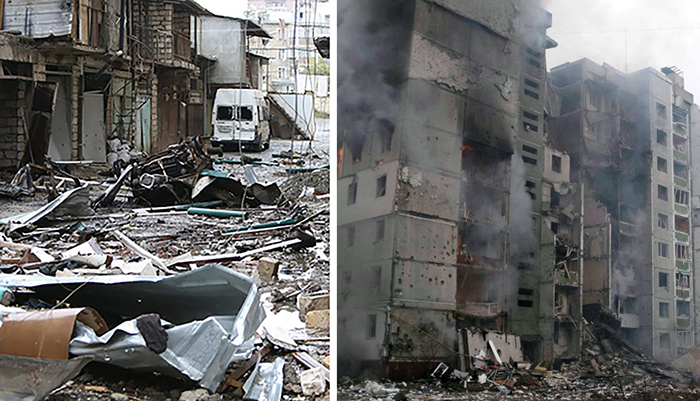
Bombing damages in Artsakh and Ukraine
Published on13 March 2022
MassisPost
ARMENIA
The world’s attention continues to be focused on the events in Ukraine. The Russian army, albeit slowly, continues to make progress, but it is still a long way from achieving its main goals. The US administration, which in the early days of the war was predicting the imminent fall of the capital city of Kyiv, has now changed its tune and is talking about Russia’s eventual defeat. The West is trying to prevent the occupation of a sovereign state by a country with extensive stockpiles of nuclear weapons and to this end, is supplying large quantities of ammunition to the Ukrainian army, which has been able to resist better-armed Russian troops for more than two weeks now.
The widespread support of Ukraine by the Western powers and the focus of the international media on the human tragedies of the war, make, Armenians wonder why the world was silent when Azerbaijan, with the help of Turkey, unleashed a war against the Republic of Artsakh, killing thousands and causing destruction and displacement.
Such application of double standards is not new by big powers, who are always driven by their own political and economic interests. The South Caucasus was of little interest to the West and saw it as a Russian zone of influence. On the other hand, during the Artsakh war, Russia’s interests coincided, to some extent, with the interests of Azerbaijan and Turkey, to which Artsakh and Armenia fell victims.
There is also another important distinction which we should take into consideration. As unpleasant as it is for us to accept, Baku managed to convince the world that the seven regions around Nagorno-Karabakh were “occupied territories” that were to be returned to Azerbaijan. During the past twenty years, all the proposals for a peaceful settlement by the Minsk Group, chaired by Russia, the United States, and France, included provisions for the return of these seven regions to Azerbaijan. Successive Armenian governments also accepted this principle, but did not have the courage to take practical steps in that direction. The only one who was ready to return some territories in exchange for peace, was the first president Levon Der-Bedrosian, who was forced to resign for suggesting a compromise solution for the Nagorno-Karabakh conflict. When Kocharyan came to power, followed by the Sargsyan administration, they both tried to pursue a policy of buying time, thinking that the “no war, no peace” situation could be prolonged forever. This strategy could have been successful, pushing Azerbaijan to come to terms with the existing status, if Armenia maintained a superior army or at least a balance of power with Azerbaijan.
The course and the outcome of the 44-day war showed that the modernization of the Armenian army during these two administrations was severely flawed. During those years, Azerbaijan spent eight times more on its army than the Armenian side. No matter how much it is said that Azerbaijan is an oil-producing country and has greater financial resources, we must also acknowledge that Armenia could have done more to strengthen its armed forces if corruption was not as widespread and rampant. It was obvious to everyone, that state funds were being wasted to accumulate personal wealth and to build huge mansions, instead of strengthening the capabilities of the armed forces to withstand the enemy’s ambitions.
The events unfolding around Ukraine should drive us to be much more realistic and far-sighted. Armenia cannot rely on other nations to defend its borders. It must pursue the goal of modernizing its army and strengthening its capabilities. At the same time, Armenia must be able to establish normal relations with neighboring countries without compromising its national interests.
This is the direction being taken by the current Armenian government and we should support it.
K. KHODANIAN
“MASSIS”
No comments:
Post a Comment